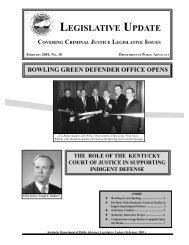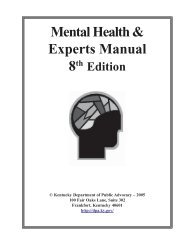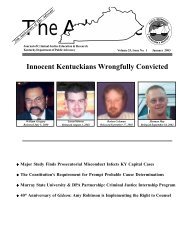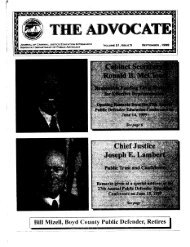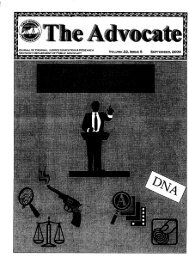May 2002 - Department of Public Advocacy
May 2002 - Department of Public Advocacy
May 2002 - Department of Public Advocacy
Create successful ePaper yourself
Turn your PDF publications into a flip-book with our unique Google optimized e-Paper software.
Continued from page 11<br />
<strong>of</strong> those stopped and searched. Caucasians were less<br />
than 20% <strong>of</strong> those stopped and searched though they<br />
comprised 74% <strong>of</strong> all speeders. A Maryland State Police<br />
internal memo discovered during litigation said, “dealers<br />
and couriers are predominately black males and black<br />
females.” The ACLU filed suit on behalf <strong>of</strong> the NAACP<br />
<strong>of</strong> Maryland and 18 individual plaintiffs, resulting in an<br />
agreement that the state police would collect data on all<br />
stops. Yet in 2000, data showed that 63% <strong>of</strong> motorists<br />
stopped and searched by Maryland state troopers were<br />
racial and ethnic minorities (50% African American, 10%<br />
Hispanic/Latino, and 3% other minority).<br />
• Pr<strong>of</strong>iling is not limited to the nation’s roadways. A study<br />
by the U.S. General Accounting Office, a congressional<br />
research agency, found that African American women<br />
returning from international flights in 1997 and 1998 were<br />
selected in disproportionate numbers by Customs <strong>of</strong>ficials<br />
for personal searches that included x-rays and strip<br />
searches.<br />
THE ADVOCATE Volume 24, No. 3 <strong>May</strong> <strong>2002</strong><br />
• In early 2000, Louisville <strong>May</strong>or David L. Armstrong said<br />
in a New York Times story that some Louisville police<br />
<strong>of</strong>ficers treat African Americans and Caucasians differently,<br />
but then fell silent as racial tensions mounted in<br />
that city. His observation was confirmed by two Louisville<br />
Courier-Journal studies conducted later that year<br />
showing a strong likelihood that African American motorists<br />
are 2-3 times more likely than Caucasian motorists<br />
to be stopped by Louisville police <strong>of</strong>ficers. In the<br />
most compelling <strong>of</strong> the two studies, while 7.6% <strong>of</strong> drivers<br />
traveling one street were observed to be African<br />
American, 22% <strong>of</strong> those stopped by the police were African<br />
American. Louisville Police Chief Greg Smith and a<br />
University <strong>of</strong> Louisville Justice Administration pr<strong>of</strong>essor<br />
attacked the studies’ methodology. However, four<br />
national experts disagreed with them, saying the studies<br />
indicate there is a problem.<br />
• Lexington-Fayette Urban County Police began collecting<br />
data on race and gender for all traffic stops after a<br />
Herald-Leader study found that black men received a<br />
disproportionate number <strong>of</strong> traffic tickets from 1995 to<br />
1998. In 1999, though Lexington-Fayette police issued<br />
traffic citations in equal proportions based on race and<br />
gender, traffic warnings went to a disproportionate number<br />
<strong>of</strong> African American women and men. The ratio <strong>of</strong><br />
police warnings was 45% higher for African American<br />
women compared to Caucasian women, and 61% higher<br />
for African American men compared to Caucasian men.<br />
Then-Police Chief Larry Walsh acknowledged publicly<br />
that he was pleased with the citation data but disappointed<br />
by the warning data. Another Herald-Leader<br />
study found that while 13% <strong>of</strong> the local population is<br />
African American, 36% <strong>of</strong> searches <strong>of</strong> motorists and pedestrians<br />
by Lexington-Fayette police from February<br />
through November 2000 were <strong>of</strong> African Americans.<br />
In addition to considering litigation, the ACLU <strong>of</strong> Kentucky<br />
has worked through public education and legislative advocacy<br />
to stop and prevent pr<strong>of</strong>iling. These efforts are a natural<br />
continuation <strong>of</strong> our racial justice work since the founding<br />
<strong>of</strong> our state organization in 1955, including our work to end<br />
school segregation, pass the Racial Justice Act to end racial<br />
bias in the death penalty, and establish civilian oversight <strong>of</strong><br />
the Louisville Police <strong>Department</strong>. Our pocket-sized “bust<br />
cards” (in English and Spanish) explain what to do if stopped<br />
by the police and are available free to the public. Our recently<br />
produced “Know Your Rights” pamphlets explain what<br />
to do if stopped by the police, the FBI, the INS, and other law<br />
enforcement agents. Also available free <strong>of</strong> charge, the pamphlets<br />
are available in English, Spanish, Arabic, Farsi, Hindi,<br />
Punjabi, and Urdu. In March, we held public forums about<br />
pr<strong>of</strong>iling in Covington, Lexington, and Louisville, with 20 cosponsoring<br />
organizations.<br />
Data collected in Kentucky so far is consistent with data<br />
from other parts <strong>of</strong> the country:<br />
The ACLU <strong>of</strong> Kentucky is also proud <strong>of</strong> spearheading community-based<br />
efforts to pass the Racial Pr<strong>of</strong>iling Act <strong>of</strong> 2001<br />
(described in Leonardo Castro’s article in this journal), working<br />
closely with sponsor Senator Gerald Neal (D-Louisville).<br />
With that law’s passage, Kentucky became the sixteenth state<br />
to pass legislation to stop and prevent pr<strong>of</strong>iling. The Racial<br />
Pr<strong>of</strong>iling Act <strong>of</strong> 2001 essentially codified an April 21, 2000<br />
Executive Order issued by Governor Paul E. Patton<br />
Though we have much more to do, other progress has occurred<br />
in Kentucky:<br />
• To build on his Executive Order, in the fall <strong>of</strong> 2000 Governor<br />
Patton announced a data collection study in which<br />
25 local law enforcement agencies agreed to collect information<br />
on the race, ethnicity, and gender <strong>of</strong> every<br />
person they stop. A preliminary report from the study<br />
has yet to be released by the Justice Cabinet but was<br />
expected in March <strong>2002</strong> and is to be released annually.<br />
• Some local law enforcement agencies have voluntarily<br />
passed policies and data collection plans on their own.<br />
Each policy is unique. While most include essential<br />
provisions, some do not include pedestrian stops, and<br />
some don’t even allow for a way to identify <strong>of</strong>ficers who<br />
might be engaging in pr<strong>of</strong>iling.<br />
Because pr<strong>of</strong>iling is based on stereotypes, the work to eliminate<br />
pr<strong>of</strong>iling practices must include challenging and dismantling<br />
false assumptions upon which stereotypes rest. An<br />
examination <strong>of</strong> these assumptions makes clear that racial pr<strong>of</strong>iling<br />
is simply bad policing. It is ineffective and a waste <strong>of</strong><br />
precious resources. Consider the following mythical assumptions:<br />
• Mythical assumption #1: It is “rational discrimination”<br />
for police to stop disproportionate numbers <strong>of</strong> minorities,<br />
who are more likely to be found breaking the law.<br />
12



